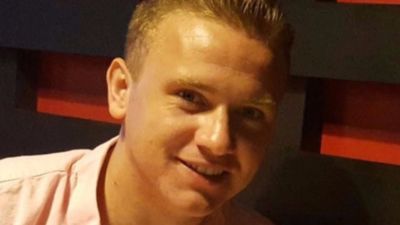Missing Suffolk airman Corrie McKeague was crushed to death in bin lorry, inquest rules

Watch an interview with Corrie McKeague's father, Martin McKeague.
RAF gunner Corrie McKeague, who vanished on a night out in 2016, died after he went into a bin which was tipped into a waste lorry, an inquest has concluded.
The airman, of Dunfermline, Fife, was 23 when he disappeared in the early hours of 24 September in Bury St Edmunds, Suffolk.
On Tuesday, an inquest jury in Ipswich recorded in a narrative conclusion that Mr McKeague was in a bin that was tipped into a waste lorry.
He was last seen on CCTV at 3.25am, entering a service area behind a Greggs shop.
Police believe he climbed into a bin which was then tipped into a waste lorry.
Suffolk’s senior coroner Nigel Parsley had summed up evidence in the case, heard by the jury over the last two weeks, on Monday.
The jury took less than a day to return its verdict.
The five men and five women recorded Mr McKeague's cause of death as "compression asphyxia in association with multiple injuries".
They also found five contributing factors in his death:
Excessive alcohol consumption;
Climbing into an industrial bin;
An ineffective search of the bin by the waste lorry driver;
Ineffective locks on the bin;
And poor visibility through a clear window on the bin lorry.
Members of Mr McKeague’s family, including his mother, father, two brothers and his daughter’s mother, were in court as the jury returned its findings.
Mr Parsley praised the family’s “quiet dignity” through the inquest. He told them: “I cannot imagine the distress and anguish you’ve felt from the moment Corrie disappeared and the terrible burden that placed on you from that day.
He described Corrie as a “charming, compassionate” young man “living life to the full”.
Mr Parsley expressed concerns about viewing panels, used to see inside the back of bin lorries, and said he would write to the British Standards Institute, bin lorry manufacturer Dennis Eagle and waste firm Biffa about these concerns.
He said he would also order a prevention of future deaths report in respect of “ineffective locks on bins”, writing to the Container Handling Equipment Manufacturers Association and Biffa.
Mr Parsley said that he would also write to Biffa about its current behaviour observation form and the risk of people in bins.
'A nightmare on the drink'
The inquest in Ipswich was earlier told that Mr McKeague, who was stationed at RAF Honington, had slept in a bin before.
He had also slept under bin bags on a previous night out, using them “like a blanket”, and was a heavy sleeper when drunk, the hearing was told.
He once downed a bottle of wine in 17 seconds, according to a friend, and was described by his former RAF line manager as a “nightmare on the drink”.
Mr McKeague was seen asleep in a shop doorway earlier on 24 September before he woke up and walked to the service area where he was last seen.
Waste firm Biffa initially told police the weight of the bin was 11kg (1st 10lbs) but it was later recorded as 116kg (18st 3lbs).
The driver of the lorry had told the inquest that he checked the contents of the bin before tipping it into the truck, and that the airman was not there.
The force said the movement of Mr McKeague’s mobile phone mirrored the movement of the waste lorry that collected the bin from the service area where he was last seen.
Mr McKeague was not seen on CCTV leaving the area on foot.
A Home Office pathologist explained that had Mr McKeague been tipped into the bin, he would been crushed or suffocated within minutes, and may not have known anything about it.
His father, Martin McKeague, said after the ruling that he hoped his son could “finally be left to rest in peace”, with the inquest shining “a new light on the truth for everyone”.